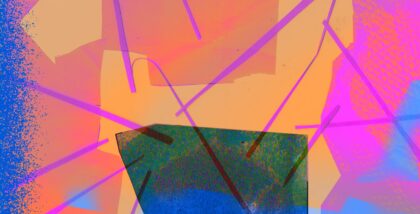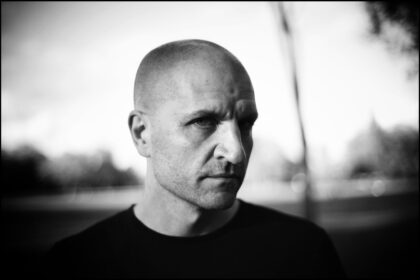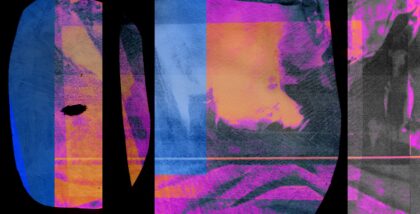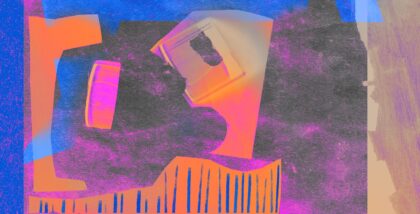In “Spirits and Specters,” the final issue of our Omens volume, we invoke survival through spirituality. We are interpreting signs excavated from interstitial spaces: the ones between ourselves, the politics of art, the legacies of colonialism and patriarchy, the spectral, and the nostalgic. Inside this constellation, we are grappling with the ineffable, the radical, and the ruptural in our politics, in our bodies, in the physical world. We know that even where belief is flimsy, the body is real.
For Nimmi Gowrinathan, her encounter in the Tamil homelands with a female fighter who dreams of “bending the sky to a bow,”and also of practicing Bharatanatyam, a classical dance, leads her to interrogate the symbol of the warrior-goddess. “Inequality falls heavy: weighing both the ankle bells of a dancer and the boots of the fighter,” she writes in “Objects of Discipline: Finding the Fighter,” an ekphrastic essay in which she is transported by a dance performance to reflect on her own past – remembering backstage aunties at dance performances with “fingers constantly fidgeting towards propriety” – as well as the past and future of the struggle. In tellings and retellings of epic stories, couplets pulled apart and “rhythmic dismantling,” culture is released from some of its constraints.
“The inflexible can be bent if you break it into enough pieces,” writes Nay Saysourinho in her short story “Auntie is Gone,” which also explores how religious practices reinscribe societal norms. When a Lao Auntie who tamed serpent-gods dies at the hands of her husband, all her good deeds seem to be nullified when the family is prevented from practicing a mourning ritual that would help Auntie in the afterlife. The story is a reimagining of Sophocles’ play Antigone, and features a chorus of monks and a distraught woman ready to transgress the rules to make things right.
“Let the women speak who have a thing to say,” entreat the waist beads of a powerful nineteenth-century West African market woman in new short fiction from Sandra Jackson-Opoku. In “African Artifacts on a Shelf of Antiquities, the British Museum, Great Russell Street, London,” their spectral whispers invite readers to listen to a story about colonial conquest and the woman who “learned to bend these new winds” to her will.
The winds of power and doubt and wonder and liberation also flow through Cynthia Dewi Oka’s poem, “At the Cliffs of Moher, I Asked for a Future,” a prayer to the unknown.
Even swaggering with opposition, I carried the bricks. Let me in, I prayed in secret, and I will be good. But like all the world’s endings, every girl who’s been left undefended, I could not afford to be good. Asked instead for love, when the Irish rains parted and the pleated body I had come for emerged, rock-blue, waisted by the Atlantic, dotted with shaking fists of Queen Anne’s lace.
Heavens, winds, and bodies call us to the truth that pursuing liberation is messy, contradictory work that entangles the historical and the fictive, the resistant and the visionary, the ghostly and all that is profoundly, stubbornly material. As China Miéville, author of A Spectre, Haunting: On the Communist Manifesto (Haymarket Books, 2022), puts it in his interview with Cynthia Dewi Oka, “[This] yearning… is inextricable from my political radicalism, … from my hatred of capitalism, …from the feeling I get – the hollow chest – when I look out over a beautiful forest, or watch an animal, or stare up at the stars… Why do we feel this way when we stand on the edge of a cliff? Why does watching a beautiful storm make you want to cry?”
-Adi Team
In this Issue

Objects of Discipline: Finding the Fighter
It was the first dance performance I had watched in nearly two decades. In the gap between young training and grown resistance, I had collapsed culture into its confinement: stories spun to immobilize.

Spectres and Ruptures on the Path to Liberation: An Interview with China Miéville
I think that just being allowed to rest is something that is deeply politically motivating for me, because capitalism will not let you rest. It will not let you rest, and there are so many ways in which we replicate that.

African Artifacts on a Shelf of Antiquities, the British Museum, Great Russell Street, London
I beg-o, let the women speak who have a thing to say.

At the Cliffs of Moher, I Asked for a Future
Who / doesn’t now feel the perpetual heartbreak of clouds: all / that view and only vanishing to look forward to?

